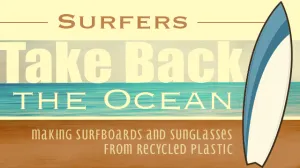Plastic trash has become one of the world’s most horrendous environmental disasters, and the amount of plastic that finds its way into the ocean is disturbing.
In industrial hubs along the ocean, like Los Angeles, about 10 metric tons of plastic ends up in the ocean on any given day. To put a metric ton into perspective, an average African elephant weighs approximately 6.8 metric tons, according to the San Diego Zoo. This means that in Los Angeles alone the equivalent weight in plastic of two elephants per day slips into the Pacific.
Very recent research on the growing problem of plastic in the ocean was published in Science (2015). It calculated that, “275 million metric tons (MT) of plastic waste was generated in 192 coastal countries in 2010, with 4.8 to 12.7 million MT entering the ocean.”
Everyone is at risk. Even if you are not an avid beach goer, the troublesome effects of plastic on our environment and ecosystem are staggering. A 2015 study presented at the Proceedings of the National Academy of Sciences (PNAS) involving 168 seabird species found that plastic ingestion by seabirds “will reach 99 percent of all species by 2050.”
The ecological damage will only increase unless something is done to limit the plastic waste rolling into the ocean with the tide. “But what can I do?” you may be asking yourself. Three American surfers took action, and so can you!
While riding waves and scouring the beaches of Australia, three surfers took their passion for the ocean to the next level. They were tired of seeing their grown-up, supersized playground become a wasteland of plastic and death for marine life. So they took their corporate skills — and surfing skills — to Chile. With help from Startup Chile, a program designed to promote innovation, they launched their sustainable business, Bureo.
Ben Kneppers, one of Bureo’s cofounders said to Takepart, “When I came to Chile I saw this hotbed of opportunity, an incredible wild natural environment, and a great support system for entrepreneurs. We thought, ‘What if we could tackle this issue that really pulls on our heart strings?’”
Bureo’s vision is to scoop out the ecological deathtrap of plastic so easily found in the ocean and recycle it into products they are passion about. Abandoned fishing nets are one of the things they recycle, crafting the material into skateboards and sunglasses.
In Chile, and many of South America’s coastal areas, there are no regulations in place for the proper disposal of fishing nets, which account for 10 percent of the plastic found in the ocean. Fishing nets are especially hazardous for sea life like dolphins, sharks and whales, as they get tangled, trapped and die.
Bureo set up a recycling effort in Chile, collaborating with local and commercial fishers. They put a new system in place that collects the nets, which would have otherwise found their way into the ocean.
One of the most popular products Bureo designs from the recycled fishing nets is the Minnow, a fish-shaped skateboard that is sold around the globe. Bureo is reaching success in the office and in the ocean, recently partnering with Karün, a Chilean based company, in hopes of launching a fishing-net inspired line of sleek sunglasses.
Recycling nylon fishing nets and other plastics, which would have otherwise added to the plastic in our oceans, has made an impact. When you look at the bigger picture, the efforts of these three surfing entrepreneurs to remove 20 tons of plastic out of the mouths and gills of sea life is a small but significant step in the right direction.
David Stover, another of Bureo’s cofounders said in an interview with Takepart, “We know that we’re not saving the world on our own, and these products aren’t the only solution. We started working with three fishing communities, and now we have eight communities. We know it’s just a very small part, but we think it could be scalable and replicable around the world.”
Any small action may help reduce the sizable amount of plastic slipping into the ocean daily. Recent research notes, “Without waste management infrastructure improvements, the cumulative quantity of plastic waste available to enter the ocean from land is predicted to increase by an order of magnitude by 2025.” Keeping the ocean clean is everyone’s responsibility. Reducing your personal plastic waste is your small part, and it could lead to bigger things.

A 2013 study published in Scientific Reports discusses the transfer of plastic chemicals to fish after digestion. The study states, “We provide baseline information regarding the bioaccumulation of chemicals and associated health effects from plastic ingestion in fish and demonstrate that future assessments should consider the complex mixture of the plastic material and their associated chemical pollutants.”
What small part can you play in ridding the ocean of plastic?
-Stephen Seifert
Stephen Seifert is a writer, professor, adventurer and a health & fitness guru. His flare for travel and outdoor adventure allows him to enjoy culture and traditions different than his own. A healthy diet, routine fitness and constant mental development is the cornerstone to Stephen’s life.
Sources:
http://animals.sandiegozoo.org/animals/elephant
http://www.pnas.org/content/early/2015/08/27/1502108112
http://www.sciencemag.org/content/347/6223/768.short
http://www.biologicaldiversity.org/campaigns/ocean_plastics
http://www.nature.com/articles/srep03263?message-global=remove&WT.ec_id=SREP-631-20131201
